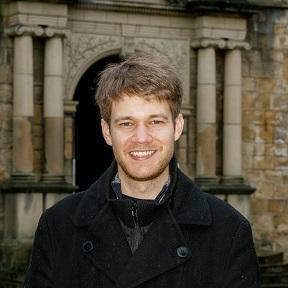Staff profile
Alexander Jansen
Technician (Digital Archaeology and Heritage)

| Affiliation |
|---|
| Technician (Digital Archaeology and Heritage) in the Department of Archaeology |
Biography
Alexander manages the Digital Visualisation Laboratory and teaches subjects ranging from photography and 3D scanning to GIS to undergraduate and postgraduate students (and provides workshops for our PhD students). He also assists our post-docs, PhD students, and UG and TPG students in developing their research methodologies on an individual basis. He manages the Departmental digital equipment such as specialised 3D scanners (and in the near future our 3D printers), photography gear, software, and other audio-visual equipment. He provides our students and staff with the tools and methodological knowledge they need to conduct their research. Alexander also produces videos and handles photography for our department, which are shared through our YouTube channel and/or on social media.
He joined Durham University in 2021, after having obtained a MSc (cum laude) in Digital Archaeology from Leiden University, the Netherlands, and a BA in Mediterranean Archaeology (with a second specialisation in Near Eastern Archaeology). During his BA studies, he also completed the extracurricular “Honours College: Crossing the borders in World Archaeology” track, with excellent grades (equivalent of cum laude).
Alexander has experience with archaeological excavations and fieldwork all over the Mediterranean, as well as in the Netherlands, Germany, and the United Kingdom. This fieldwork ranges from geophysical surveying to 3D drone surveys, as well as conventional excavations. His own research focuses on the spatial analysis of the built environment and 3D modelling. He specialises in Structure-From-Motion (photogrammetry), with both conventional cameras as well as drones and multispectral photography, but also other digital data (including 3D) acquisition methods.
Since 2018, he has been a member of CAA International (“Computer Applications and quantitative methods in Archaeology”), and is one of the founding committee members of the CAA Special Interest Group "3D Spatial Analysis" (3D Spatial Analysis - CAA International). At the CAA 2021 conference in Cyprus, he was the main organiser of the “Exploring the possibilities of 3D Spatial Analysis” session.
Research interests
- Digital Archaeology
- 3D scanning
- 3D reconstructions
- Drone surveying
- Photogrammetry
- Structured light scanning
- Laser scanning (incl. LiDAR)
- Reflectance Transformation Imaging
- Multispectral Imaging (UV+IR)
- Remote Sensing
- Space Syntax
- Agent based modelling (ABM)
- Spatial Analysis
- Geographical Information Systems (GIS)
- Photography (incl. Medium Format: extreme resolution)
Esteem Indicators
- 2024: Teaching and Learning Awards 2024 - Unsung Hero: Awarded the 2024 "Unsung Hero" Teaching and Learning Award. For my efforts for designing and teaching a new module in 3D scanning (last-minute, to cover for a staff member), and for - in the midst of suddenly needing to move my laboratory twice - ensuring that student and staff support was never reduced.
Publications
Chapter in book
- Revisiting old data with new techniques: A re-evaluation of insulae V ii and IV ii in Ostia through the eyes of space syntaxJansen, A. C. (2020). Revisiting old data with new techniques: A re-evaluation of insulae V ii and IV ii in Ostia through the eyes of space syntax. In H. Kamermans & L. van der Meer (Eds.), Designating Place: Archaeological Perspectives on Built Environments in Ostia and Pompeii (pp. 135-152). Leiden University Press.
Conference Paper
- The potential of Space Syntax methodsJansen, A. (2019, December 5 – 2019, December 7). The potential of Space Syntax methods [Conference paper]. Presented at Graphendatenbanken, GIS und 3D-Modelle in der Bauforschung des Mittelalters, Heidelberg, Germany.
- Applying space syntax to insula V ii in Ostia: A comparative assessment of four space syntax methodsJansen, A. (2019, April 23 – 2019, April 27). Applying space syntax to insula V ii in Ostia: A comparative assessment of four space syntax methods [Conference paper]. Presented at CAA 2019, Kraków, Poland.
- Quantifying functions in urban contexts: Reconstructing the functions of spaces based on spatial characteristicsJansen, A. (2019, February 4 – 2019, February 6). Quantifying functions in urban contexts: Reconstructing the functions of spaces based on spatial characteristics [Conference paper]. Presented at International Colloquium on Digital Archaeology., Bern, Switzerland (Oeschger Centre for Climate Change Research).
- 3D Visualizations and OstiaLocicero, M., Stoger, H., & Jansen, A. (2017, June 15). 3D Visualizations and Ostia. Presented at Conference for Digital Heritage Annual Meeting, Leiden, the Netherlands.
Journal Article
- Space syntax in a Roman tomb: Spatial analysis of the tomb of the ScipiosJansen, A. C. (2020). Space syntax in a Roman tomb: Spatial analysis of the tomb of the Scipios. Tijdschrift Voor Mediterrane Archeologie, 62(31).
Masters Thesis
- Applying space syntax methods to insula V ii in Ostia: To gain new insights into the effects of changes in the spatial organisation of urban buildings during the Late Roman EmpireJansen, A. C. (2018). Applying space syntax methods to insula V ii in Ostia: To gain new insights into the effects of changes in the spatial organisation of urban buildings during the Late Roman Empire [Dissertation]. Awarding Organisation: Unknown.
Presentation
- SUB-MILLIMETRIC SFM 3D SCANNING OF MEDIEVAL ARCHITECTURE: PHOTOGRAMMETRIC DIGITAL TWIN OF THE DURHAM NORMAN CHAPEL FOR CONSERVATION AND HERITAGE MANAGEMENTJansen, A., & Rennie, G. (2024, August 28 – 2024, August 31). SUB-MILLIMETRIC SFM 3D SCANNING OF MEDIEVAL ARCHITECTURE: PHOTOGRAMMETRIC DIGITAL TWIN OF THE DURHAM NORMAN CHAPEL FOR CONSERVATION AND HERITAGE MANAGEMENT. Presented at European Association of Archaeologists 30th Annual Meeting, Rome.

